Mother tongue is a fundamental tag that ties people into a particular identity. More than geographical identities, it is the idiom you inherit that makes you a people. Humans tend to dream in their mother tongue and it is the language you speak that shapes up your perception. But it is to note with great concern that we are fast losing this peculiar identity. The Kashmiri language, which binds us into a distinctive character, is dying a leisurely death. The official apathy apart, the people who get identified by this language are no less responsible for its gradual fall. There is hardly any household, more particularly at middle class and upper class levels, where this language is spoken. People take pride in making their children speak other languages than mother tongue. This is true about those too who swear by this language day in and day out. Its natural corollary is that our new generation has distanced from their Kashmiri language. A feeling of guilt and a complex of inferiority is overtaking them when they talk in their mother tongue. It should not be viewed as exaggeration that many a Bihari labourers speak Kashmiri language better than progenies of some middle and upper class Kashmiri families.
The official apathy has only but added to the demise of Kashmiri language. The entire government machinery is busy with fulfilling political agenda. They measures things, howsoever non-political these may be, only through the thermometer of politics. The southern states of India could have been a great example for the government to follow in promoting Kashmiri language. Tamil Nadu, Karnataka, Kerala and Andhra Pradesh have accorded top priorities to their respective languages and the governments in place have done everything to promote and preserve their state languages. Not many years ago, Tamil Nadu government imposed ban on telecast of Hindi news from national network of Doordarshan. In this prime time news, the Tamil Nadu Kendra of Doordarshan, instead, telecast local news in local language. The same is true about Kerala and Andhra as well. These states kept their languages alive through the medium of films, dramas and other programmes telecast from Doordarshan. It would not be going overboard to say that Doordarshan Kendra Srinagar is the primary institution of destroying Kashmiri language. The time slot allotted to Kashmiri language in DDK programmes could not be more than three in 24-hour transmission.
The role of civil society and NGOs has been even worse. Dozens of language promotion groups surfaced in mid-90s all across Kashmir, pleading and campaigning for promotion of Kashmiri language. Most of these groups had been formed with limited political agenda. They vanished from the scene soon after completing what they had been made for. The politics over Kashmiri language is still on. Some groups based in Delhi are trying hard to get the present script of Kashmiri language, which resembles to Urdu and Persian, changed into Devnagri (Hindi). Some time back they submitted a memorandum to the ministry of Human Development Resources (HRD) to change the script. If this happens, it would be the last nail in the coffin of this language.
Against this backdrop the activities of Adabi Markaz Kamraz (AMK), a non-government literary organization working for promotion and preservation of Kashmiri language, are quite appreciable. The AMK, the other day, held conference at Pahalgam in which more than 300 writers and poets of Kashmiri language participated. Nothing more can be as delighting as announcement by AMK to hold an international conference in which poets and writers (of Kashmiri language) would be invited from world over. It is time to reshape and reform our identity by promoting mother tongue at all levels of communications within and outside our households. Our individuality as political identity has already been eroded, let us remake it, at least, at linguistic level. Our all thoughts and actions have got so politicized that our efforts, howsoever non-political they may be, are stonewalled by political means.
Being a Kashmiri




